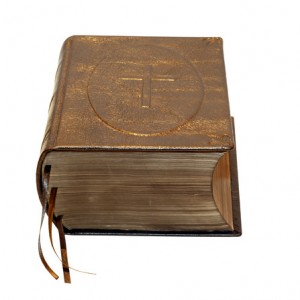 In the last few posts we’ve been dealing with text criticism (in general, for the OT, for the NT), the art and science of studying the biblical manuscript tradition to arrive at the most accurate possible text of scripture (from which all of our English translations are derived). This leads to great confidence in the astonishing accuracy of our text (and provides remarkable evidence of the providence of God in preserving such outstanding witnesses throughout history). Today we turn to a different question, really a prior question:
In the last few posts we’ve been dealing with text criticism (in general, for the OT, for the NT), the art and science of studying the biblical manuscript tradition to arrive at the most accurate possible text of scripture (from which all of our English translations are derived). This leads to great confidence in the astonishing accuracy of our text (and provides remarkable evidence of the providence of God in preserving such outstanding witnesses throughout history). Today we turn to a different question, really a prior question:
Who gets to decide what books belong in the Bible anyway? Granting the accuracy of the books we do have, how do we know we have the right books? Perhaps there are other books that should have made the cut but didn’t (Gospel of Thomas? 1 Enoch? Etc….), or perhaps there are books that made the cut but shouldn’t have done so (Song of Songs? Esther? James? Revelation? Etc….). Other religions have other books (the Koran?); some claim new revelation (the Book of Mormon?); should we receive these as scripture? Why or why not?
Who gets to decide? And what are the criteria? These are questions of canon (pronounced just like the really big gun). The English word canon is simply a transliteration of the Greek word kanon, which means “rule.” Rule here means “measure” or “standard” (think of a ruler). The canon reflects those books which “measure up.”
Who gets to determine whether a particular book of the Bible measures up? It has become popular in recent years to pretend that the formation of the canon was a partisan political process. “The Church” arbitrarily decided that some books belong in the canon and some books do not belong in the canon. There were lots of good candidates that should have been included (like The Gospel of Thomas) says a Dan Brown or an Elaine Pagels, but these were excluded because they didn’t fit the agenda of the church authorities. This is a gross mischaracterization of the story, as I’ll try to clarify as we unfold the issues of canon in the posts to follow.
For today it is enough to deal with this one question – did “The Church” determine the canon (whether in 325 AD or at some other time)? Here we bump up against one significant difference between Roman Catholics and Protestants. This difference can be summed up in the distinction between these two options:
Option 1: The canon is an authoritative list of books. This is the Roman Catholic view. The Church decided which books made the cut and which ones didn’t. The authority and tradition of Mother Church is the criterion for settling canonicity. This view comes with some problems. Can the Church change her mind? How do we know she got it right? Doesn’t the Church sometimes make mistakes?
Option 2: The canon is a list of authoritative books. This is the Protestant view. Wait…what’s the difference? Notice that the word “authoritative” now modifies not “list,” but “books.” The Protestant view is that the books themselves demonstrate their canonicity. They don’t receive their status as scripture from any church pronouncement. It is the Holy Spirit who gets to decide. The church isn’t determining which books are canonical, she is just recognizing which books the Holy Spirit is demonstrating to be canonical.
This may seem a minor distinction, but it is one that is fraught with significance as we consider the history of the formation of the Old Testament and New Testament canons.
More to come…